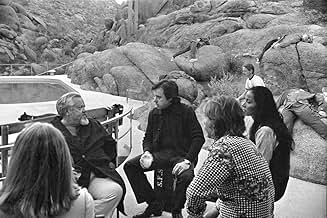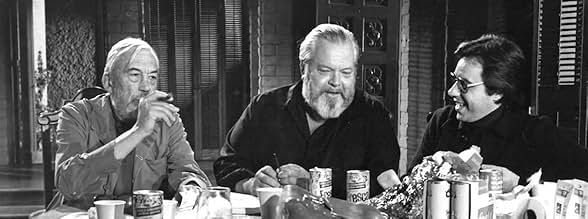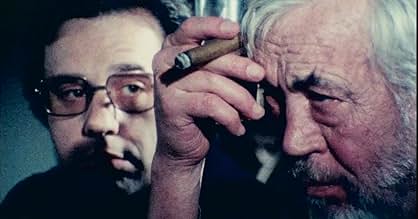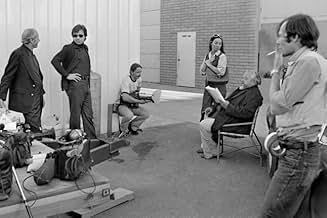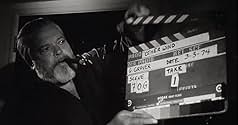Agrega una trama en tu idiomaIn the final fifteen years of the life of legendary director Orson Welles, he pins his Hollywood comeback hopes on a film, The Other Side of the Wind (2018), in itself a film about an aging ... Leer todoIn the final fifteen years of the life of legendary director Orson Welles, he pins his Hollywood comeback hopes on a film, The Other Side of the Wind (2018), in itself a film about an aging film director trying to finish his last great movie.In the final fifteen years of the life of legendary director Orson Welles, he pins his Hollywood comeback hopes on a film, The Other Side of the Wind (2018), in itself a film about an aging film director trying to finish his last great movie.
- Premios
- 2 premios ganados y 2 nominaciones en total
- Self - Director
- (material de archivo)
- …
- Self - Camera Operator
- (as Mike Ferris)
- Self - Editor
- (as Jonathan Braun)
Opiniones destacadas
And Alan Cumming is just too precious.
Some of the stuff from the talking heads here is irrelevant (e.g. Welles's reported fondness for Fudgsicals) and armchair psychology, but there's enough information about the production of "The Other Side of the Wind," with clips not used in the release print edited in here, as well as looks at some of Welles's other pictures to make this documentary worthwhile. I think the end clip of Welles wishing that everyone would see his film is especially apt given its final distribution by Netflix, which as the most-popular online movie streaming service offers the best hope of fulfilling that wish. And, Welles's film may be the best thing Netflix has yet distributed. It's a fitting end for a film, too, that is partly about the death of classical Hollywood and the rise of a New Hollywood that admires an auteur of the prior generation and which features then-new forms of motion-picture making and viewing--TV, 16 and 8mm cameras and the drive-in theatre--technologies and platforms that themselves have since been largely or, at least, partially superseded by computers, digital technology, smart phones and streaming.
On a logistical level, this film is not what one would expect... most all of the friends and colleagues become talking heads who are not individually identified, until the rolling credits, where a slew of names are lined up. That said, Peter B is easily recognized, and a few others' identities are inferred by their comments. When Oja speaks, you are left to imagine what she looks like nowadays... I presume that she insisted that her sound bites would not include visuals.
What disappointed me the most were the cynical snipes made about the approach and demeanor of Welles, from several people closely associated with him. Some of their barbed comments served to discount the great complexity of this man. I wonder if these folks had enough nerve to frankly state their views in front of his face while he was alive? One celebrity commented on his demanding preference for a particular snack food. On the surface, the remark said more about her.
It strikes me as ironic that one clip shows Welles speaking on the essential value of editing, yet this film has chosen to slice things up into brief sound bites. As a result, the tone of the interviewees resemble a bitter pill, as if to say: while we might recognize the genius of this man, the viewer would do well to witness his significant deficiencies.
There are cherry-picked clips which try to convince the viewer about Welles impulse to control the details. Newsflash: many great artists fall prey to obsessiveness. We see Welles give a specific note to Norman Foster on his delivery. Foster transformed the line in-a-flash, and it was vastly improved. If this film intended to cast a shadow on the esteemed artful nuances which Welles strove for, then it failed.
Each viewer will have a different take on this film. As for me, the approach and tone of this film left me feeling defensive, and a bit sad.
Now that are issues that some people would love to have. On the other hand, someone like Hitchcock made many good movies and he never fell into that trap. But back to this: Many of his peers talk about him and there is a big amount of the time dedicated to the last movie Welles never actually finished. He shot it for so many years, but never seemed satisfied. From what I have seen so far, it might have been ahead of its time back then - obviously the cut of The other side of the wind that is now available to watch via stream is not the one Welles would have released. Still it is the footage he shot, so more on that on the other page. This documentary is quite revealing when it comes to Welles character - with enough footage of him, but also a lot of people who were close to him, talking about their experience ... Essential in a way
¿Sabías que…?
- ErroresA clip from "It's All True" labels the film as "Unreleased." In fact, it was completed and distributed by Paramount in 1993.
- Citas
Peter Jason: Orson said to me once that, "Los Angeles is the only city where every roads leads to the airport. If you're here, Hollywood can't wait to get you out of here''.
- ConexionesFeatures Alicia en el país de las hadas (1933)
- Bandas sonorasHeart of the Sunrise
Written by Jon Anderson, Chris Squire, Bill Bruford and Rick Wakeman
Performed by Yes
Courtesy of Atlantic Recording Corp.
By arrangement with Warner Music Group Film & TV Licensing
Selecciones populares
- How long is They'll Love Me When I'm Dead?Con tecnología de Alexa
Detalles
- Tiempo de ejecución1 hora 38 minutos
- Color


